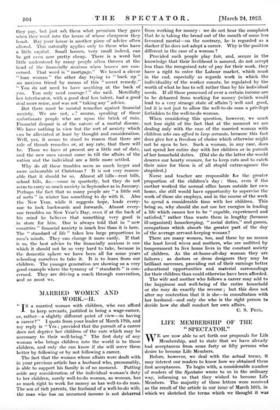MARRIED WOMEN AND WORK.—II.
" TS a married woman with children, who can afford to keep servants, justified in being a wage-earner, or, rather—a slightly different point of view—in having a career ?" I quote from your leader of March 17th, and my reply is " Yes ; provided that the pursuit of a career does not deprive her children of the care which may be necessary to their well-being." The first duty of any woman who brings children into the world is to those children, and only she can know if she will serve them better by following or by not following a career.
The fact that the woman whose affairs were dealt with in your previous article' has a husband who, presumably, is able to support his family is of no moment. Putting aside any consideration of the individual woman's duty to her children, surely well-to-do woman, as woman, has as much right to work for money as has well-to-do man. The son of rich parents, the husband of a well-to-do wife, - the man who has an unearned income is not debarred from working for money : we do not hear the complaint that he is taking the bread out of the mouth of some less favoured mortal—on the contrary, he is regarded as a slacker if he does not adopt a career. Why is the position different in the case of a woman ?
Provided such people play fair, and, secure in the knowledge that their livelihood is assured, do not accept less than the recognized rate of pay for their work, they have a right to enter the Labour market, which must in the end, especially as regards work in which the individuality of the worker counts, be regulated by the worth of what he has to sell rather than by his individual needs. If all those possessed of over a certain income are to be debarred from working for money (which would lead to a very strange state of affairs !) well and good, but it is not just to allow the well-to-do man a privilege forbidden to the well-to-do woman.
When considering this question, however, we must not lose sight of the fact that at the moment we are dealing only with the case of the married woman with children who can afford to keep servants, because this fact does give her a freedom of choice which otherwise might not be open to her. Such a woman, in any case, does not spend her entire day with her children or •in pursuit of her household duties. (Did she do the latter she would deserve our hearty censure, for to keep cats and to catch their mice for them is of all stupid extravagance the stupidest.) • Nurse and teacher are responsible for the greater proportion of the children's day : thus, even if the mother worked the normal office hours outside her own home, she still would have opportunity to supervise the work of those she employs, and in the course of the week to spend a considerable time with her children. This being so, why should she not use her energies in leading a life which causes her to be " capable, experienced and satisfied," rather than waste them in lengthy (because ill-organized) housekeeping, " social duties," and games, occupations which absorb the greater part of the day of the average servant-keeping woman?
There are many women, too, and these by no means the least loved wives and mothers, who are unfitted by temperament to live home lives in the constant society of children. As the at-home-all-day woman they are failures ; as doctors or dress designers they may be brilliant successes, providing out of their earnings better educational opportunities and material surroundings for their children than could otherwise have been afforded.
The wife and mother who follows a career may add to the happiness and well-being of the entire household or she may do exactly the reverse ; but this does not alter my contention that it is she—in consultation with her husband—and only she who is the right person to decide how she shall conduct her own affairs.
C. S. PEEL.


































































 Previous page
Previous page